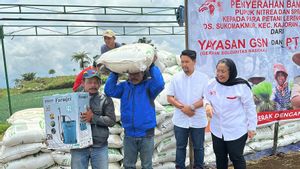JAKARTA - Director of Indonesia Development and Islamic Studies (IDEAS) Yusuf Wibisono said the momentum to maintain economic growth during a global recession should be focused on three things.
One of them is encouraging investment into the regions.
Second, Yusuf continued, providing incentives to the informal sector which is a savior during times of crisis. The last is to maintain food inflation.
"Investments must be encouraged to go more to the regions, develop sluggish sectors due to the pandemic and support the economy," he said, in Jakarta, Friday, March 3.
The three sectors affected by the weakening of the world economy are commodities, manufacturing and tourism industries.
"The best strategy that can be encouraged to maintain the momentum of regional growth during the global recession is to direct optimal public investment in these sectors, accompanied by optimal regulatory and institutional support," said Yusuf.
Takh hanya itu, menurut Yusuf, pemerintah juga harus menjaga daya beli rakyat dengan mengintensifkan Bansos dan juga menjaga inflasi, terutama inflasi pangan.
"The focus on suppressing food inflation is crucial because food prices tend to fluctuate, it is very easy to jump when there is a disturbance in the production or supply chain," he explained.
According to Yusuf, intensifying Social Assistance to maintain people's purchasing power is important, especially for people's access to food.
Furthermore, Yusuf said that high food inflation will have a major blow to people's purchasing power, especially the lower middle class where food is the largest component of their spending. If food inflation cannot be controlled, in the future the poverty rate will certainly increase.
"The agenda for suppressing food inflation is to secure domestic food production, especially by ensuring the availability and stability of agricultural input prices at the farmer level, especially seeds, fertilizers and irrigation," said Yusuf.
Main attention must be paid to key food commodities such as rice, soybeans, corn, chicken meat, chicken eggs, sugar and cooking oil. "Securing crucial domestic production due to our food surplus is thin," he said.
Meanwhile, Executive Director of the Center of Reform on Economics (CORE) Indonesia Mohammad Faisal highlighted that Indonesia's economic conditions in 2023 will be quite difficult to repeat success in the previous year.
According to Faisal, Indonesia's economic conditions last year were driven by high commodity prices.
This is because the household consumption and investment sectors have not been able to recover as before the pandemic, although they tend to strengthen.
Then, why 5.3 percent? It was helped a lot by external conditions. The price of commodities that make our net surplus is very large, thus encouraging economic growth of more than 5 percent," he said.
According to Faisal, Indonesia should work harder to match the economic growth rate in 2022.
This is due to external conditions that are still unstable.
Several large countries of Indonesia's trading partners such as the United States and the European Union still have not fully risen from the economic downturn. This greatly affects the decline in demand factors (demands).
"Because the determining factor is external conditions which are actually under pressure from the demand side this year, especially in countries that are the main partners, which is also the largest economy that affects emerging market countries such as Indonesia, America, and the European Union, which have decreased demand. This means that exports (Indonesia) will decrease," he explained.
Nevertheless, Indonesia can still hope for commodity prices in the global market. Even though it has passed its peak period, commodity prices are predicted to be relatively higher than during pre-pandemic.
"It keeps our export net large enough this year. Keep it a surplus. And, it will help economic growth in 2023," he concluded.
Previously, Coordinating Minister for Economic Affairs Airlangga Hartarto said the Indonesian economy grew impressively at 5.3 percent in 2022 thanks to strong consumption and good exports and investments.
In addition to the economy growing positively amid global challenges, Indonesia is also the main economic engine in Southeast Asia which covers 40 percent of Southeast Asia's population and 35 percent of Southeast Asia's GDP.
Access to Indonesia means entering one of the most politically stable and economically stable areas in the world. Investors must consider Indonesia as a market, production base, and an export center," said Airlangga.
The English, Chinese, Japanese, Arabic, and French versions are automatically generated by the AI. So there may still be inaccuracies in translating, please always see Indonesian as our main language. (system supported by DigitalSiber.id)













